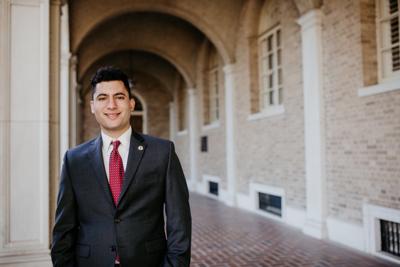In addition to Texas students coming together on their campuses to provide support during the COVID-19 pandemic, students from different universities are gathering forces to change the mindset toward combating the virus.
The College Health Alliance of Texas is dedicated to expressing the importance of following health guidelines regarding COVID-19. Since its inception in June, CHAT still is continuing different efforts to help multiple campus communities in Texas, especially at Texas Tech.
Faisal Al-Hmoud, Tech Student Government Association external vice president and member of the CHAT executive committee, said the initial idea behind CHAT was to change the culture surrounding COVID-19. He said some believe it is not cool and not necessary to wear a mask, which is simply not true.
“The problem became super political and divisive,” Al-Hmoud said.
Al-Hmoud was worried for the spring semester if students did not step up and do their part, he said. To Al-Hmoud and Austin Hickle, student-body vice president for Southern Methodist University and member of the CHAT executive committee that helped form the alliance, the answer was clear: they needed to bring together student leaders from across the state to help lead the generation and give them a voice.
Al-Hmoud helped Hickle contact schools from all over the state, he said. From the University of Texas at El Paso to Baylor University., Al-Hmoud said the CHAT website provides a list of all members involved in the alliance.
“We have released memos and write articles regarding COVID and why it’s important to step up to the plate as students,” Al-Hmoud said regarding certain CHAT efforts.
Texas Gov. Greg Abbott retweeted one of CHAT’s tweets, Al-Hmoud said regarding the alliance being noticed. The alliance also has been been featured in different news publications.
The process of forming CHAT came about in June while Hickle was helping SMU administration decide how classes would look in the fall, he said. These plans all were dependent on the students.
“I felt we could spend the whole summer working to figure out the requirements and restrictions and put them all in place,” Hickle said. “but when the students get back to campus it’s really going to depend upon their ability to buy in to those restrictions.”
There were two things the individuals involved in CHAT came together to do, Hickle said.
First, they put together a student guide on the CHAT website, Hickle said. This guide includes CDC guidelines, study tips for online classes, planning events for a large group and what to do if one finds themselves in quarantine.
CHAT’s next step is to launch a state-wide survey to gather tangible data about how Texas students feel about the pandemic, Hickle said. The survey includes question on academic changes but also the mental health of students and how they feel going into the job market.
After they receive the data from the surveys, Hickle said they will begin conducting round tables locally and federally to express what students feel toward the pandemic and decision makers. He said they are hopeful the information they present will help aid or influence decision making.
There are now 24 campuses in Texas that are involved in CHAT, Hickle said.
“We’re in consistent communication about how to change approaches on respective campuses and how we can work with each other to better the situation for our students,” Hickle said.
Together, Hickle said the alliance hopes to encourage students to do their part to quell the pandemic and come together to find solutions.
“This pandemic is one of our generations defining moments,” Hickle said. “I’m really excited not only for what we’ve accomplished but what we will accomplish in the future.”
Tessa Schreiber, external vice president for the student government association at Rice University, said she decided to get involved in CHAT because, right now, there is a huge issue of variance within college campuses when it comes to COVID-19 resources for students.
CHAT’s goal is to help rectify some of that variation and to provide resources that are supported by a large body of students, Schreiber said.
“Everyone is able to do their part and do so in an informed way,” Schreiber said.
With experience with government advocacy as well as experience in the Student Government Association at Rice, Schreiber said she hopes her experience will be helpful in assisting CHAT in reaching its goals. Personally, she said her goal is to be as supportive as possible, especially for the informative goals.
It is important that government officials know what college students and young people think about COVID-19, and how they feel about the way things are being handled, Schreiber said.
“I think the goal is to be able to provide information to officials in the most bipartisan way possible at as many levels of government as possible,” Schreiber said.
To learn more about CHAT, or to get involved with the movement visit https://collegehealthallianceoftexas.com/.



(0) comments
Welcome to the discussion.
Log In
Keep it Clean. Please avoid obscene, vulgar, lewd, racist or sexually-oriented language.
PLEASE TURN OFF YOUR CAPS LOCK.
Don't Threaten. Threats of harming another person will not be tolerated.
Be Truthful. Don't knowingly lie about anyone or anything.
Be Nice. No racism, sexism or any sort of -ism that is degrading to another person.
Be Proactive. Use the 'Report' link on each comment to let us know of abusive posts.
Share with Us. We'd love to hear eyewitness accounts, the history behind an article.